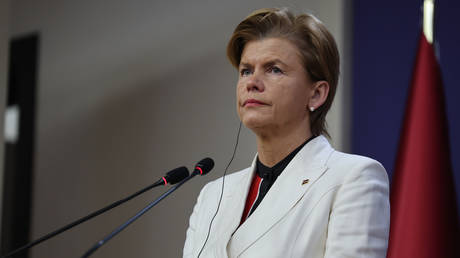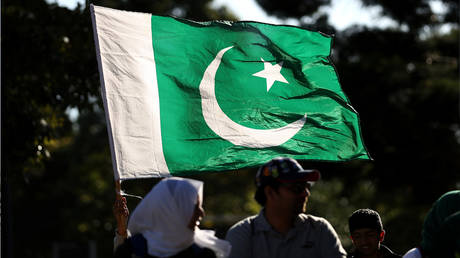Madam Vice President,
Excellencies,
Distinguished Delegates,
Ladies and Gentlemen,
The UPR Working Group reviewed, for the fourth time, the state of human rights in Eritrea on May 6 this year in this very room. On that occasion, a delegation, led by myself, presented the progress made by the State of Eritrea in the protection and promotion of human rights during the reporting period.
Today, with the same enthusiasm and commitment, we appear before the Human Rights Council at its 57th session to present and defend the official position of the Government of the State of Eritrea in the interactive dialogue leading up to the adoption of the UPR report.
At the outset, we wish to thank once again all 98 states that participated in our review. We also take this opportunity to express appreciation to the esteemed members of the Troika—our distinguished colleagues from Malawi, Kuwait, and Romania—for facilitating the review process. Our gratitude also extends to the Secretariat for their meticulous hard work in preparing this report, and interpreters for patiently and ably translating our proceedings.
Mr. President, Excellencies,
Let me recall that Eritrea chose not to immediately take positions on the recommendations received at the Review Session. The reason is simple. We have a national process to follow. Therefore, before delving into the decision, let me briefly dwell on the process.
The government pursues an integrated multi-sectoral approach to development and human rights. Hence, it has institutionalized a formal mechanism—the National Working Committee on the UPR—to strengthen coordination. This Committee, composed of government ministries, national organizations, and other stakeholders, not only plays a key role in overseeing UPR reporting but also monitors and tracks national follow-up obligations arising from the UPR reporting cycles.
Therefore, the Government of Eritrea’s decision is informed by the same comprehensive national consultations spearheaded by the Ministry of Foreign Affairs. Now, back to the decision:
After carefully considering all 293 recommendations, we are pleased to inform you that Eritrea has decided to fully accept 126 recommendations, whereby it has taken note of 160 others. Additional clarification is provided on another 7 recommendations, indicating which part of the recommendation has been supported and which part noted. Clarification is also provided on the remaining 5 recommendations which are rejected on the basis of factual mistakes and their irrelevance to our national context.
Madam Vice President, Excellencies,
While time will not permit me to elaborate on each recommendation, I wish to highlight the general logic behind some of the decisions.
Let me underscore that the decisions encapsulate our strong desire to enhance the promotion and protection of human rights. Our societal
norms, national values, and domestic laws were given due consideration. Though these norms and values take credence, the decision also took cognizance of Eritrea’s obligations under applicable international human rights treaties.
The wording and spirit of the accepted recommendations somewhat align with Eritrea’s principles. This alignment facilitated their ready acceptance and will facilitate their upcoming implementation. It is important to note that most of the accepted recommendations either have already been implemented, or are currently being implemented, or will be implemented during the Fourth UPR Cycle. That’s why Eritrea has accepted them unreservedly and is committed to implementing them in full.
As stated above, additional clarification was provided on seven partially supported recommendations. According to their wording, these recommendations contain more than one part. Hence, the additional clarifications contained in the Addendum indicate which parts of the recommendations have been supported and which parts have been noted.
Madam Vice President, Excellencies,
It is noteworthy that the principles employed to accept recommendations are also the same principles for which the remaining 160 recommendations are noted and the five recommendations rejected. I will endeavor to highlight the general rationale behind these decisions.
The State of Eritrea has noted recommendations that, for obvious reasons, do not correspond to the legal and socio-cultural principles to which it gives credence. These recommendations call for changes to existing laws, regulations, and policies within impractical time frames or infringe on matters that Eritrea is not in a position to consider.
Simultaneously, Eritrea rejects outright attempts to impose concepts and ideas that contradict the core principles outlined in the Universal Declaration of Human Rights. Some nonconsensual concepts infringe upon the sovereignty and social, cultural, and religious sensitivities of several member states, including Eritrea.
Eritrea cannot and must not support recommendations that are based on factual inaccuracies and that do not fit the national context. We have heard many unfounded allegations and claims, and we believe that the reality in Eritrea and the great qualitative developments achieved on the ground are the best responses to such allegations and claims.
Additionally, it is important to emphasize that some of the rejected recommendations fell outside the scope of the UPR framework. A few even diverged from the UPR’s core principles, which aim to foster and enhance the promotion and protection of human rights globally. Several of these noted and rejected recommendations did not adhere to the UPR’s essential requirements of impartiality, transparency, a non-confrontational, and non-politicized approach.
Eritrea underlines that the UPR is an important platform for countries to conduct equal-footed and candid exchanges on human rights issues and engage in constructive dialogue and cooperation within the framework. Its purpose is to increase exchange and mutual learning and promote common progress.
In General, Eritrea does not entirely reject the possibility of revising those recommendations as appropriate. I cannot fail to mention that taking note of certain recommendations does not in any way mean that we are not committed to the rights addressed in those recommendations. Rather, the issue relates to a difference in the method and formulation described in those recommendations.
Eritrea is willing to work with all parties for constructive review and to maintain the dialogue-oriented and cooperative nature of the UPR while upholding the principles of objectivity, fairness, non-selectivity, non-confrontation, and non-politicization.
Mr. President, Excellencies,
We would like to reiterate the Government of Eritrea’s unwavering commitment to promoting and protecting the human rights of all persons in Eritrea. This commitment is deeply ingrained in our national ethos, epitomized by the Development Strategy, which seeks to ensure the dignity, security, and prosperity of every citizen.
As outlined in our national report, Eritrea has always adhered to a people-oriented approach and has made significant strides toward achieving social equity. In accordance with our core policy of social justice and in line with the Universal Declaration of Human Rights, the Government of Eritrea is dedicated to maintaining this policy, which includes but is not limited to the provision of a full cycle of free education, free health-care, and other social services.
While much has been done in this regard and across a broad range of fields, we acknowledge that challenges remain. We assure you of our unwavering determination to meet these challenges to further improve the human rights situation in our country in a transparent, verifiable, and sustainable manner.
These efforts, however, face significant challenges, particularly due to the imposition of Unilateral Coercive Measures (UCMs), which have been imposed on Eritrea by certain states. These measures, not only undermine national sovereignty but also create formidable barriers to the effective implementation of human rights policies and development programs.
Despite this, Eritrea remains fully committed to its reporting obligations and takes this opportunity to announce the recent presentation and submission of its second Voluntary National Review (VNR). Eritrea has made tremendous efforts to stay aligned with the global development objectives, to share our progress, and to engage with the international community.
To conclude, Madam Vice President, I should underscore that the State of Eritrea attaches high importance to the Universal Periodic Review process as an important mechanism of the United Nations Human Rights Council. This state-driven mechanism is viewed as an enabler of information sharing and a useful tool to promote peer learning.
On this note, my delegation and I look forward to a productive interaction.
Thank you.





+ There are no comments
Add yours